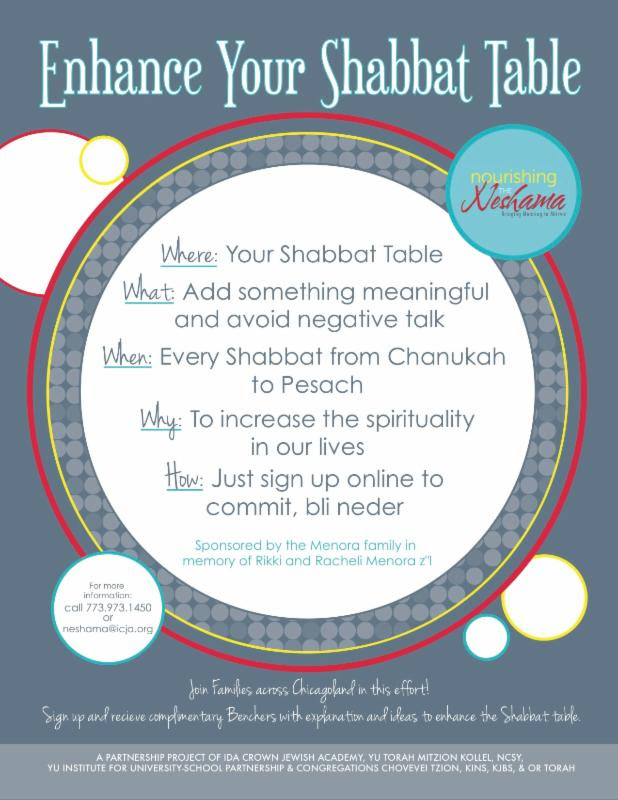Do you live with regrets?
I do and you can see them at beyondbt.com.

Do you live with regrets?
I do and you can see them at beyondbt.com.
 A new initiative is starting on Shabbos between Chanukah and Pesach, as families throughout Chicagoland are committing to spend the next few months dedicated to adding renewed meaning to their Shabbos table. Please click on this link (it takes less than one minute to sign up) to receive materials in the mail this week to start enhancing your Shabbat table experience! This program is being sponsored by the Menora family for sponsoring this initiative in memory of Rikki & Racheli Menora z”l.
A new initiative is starting on Shabbos between Chanukah and Pesach, as families throughout Chicagoland are committing to spend the next few months dedicated to adding renewed meaning to their Shabbos table. Please click on this link (it takes less than one minute to sign up) to receive materials in the mail this week to start enhancing your Shabbat table experience! This program is being sponsored by the Menora family for sponsoring this initiative in memory of Rikki & Racheli Menora z”l.
 I am uber-happy to announce that I will have an original post (read-won’t take a post from this blog and recycle it) about once a month on Oy! Chicago, “Oy!Chicago is for the socially conscious, intellectually curious, community-minded. Oy! is home to articles, blog posts, event listings and ongoing discussions about Jewish life.”
I am uber-happy to announce that I will have an original post (read-won’t take a post from this blog and recycle it) about once a month on Oy! Chicago, “Oy!Chicago is for the socially conscious, intellectually curious, community-minded. Oy! is home to articles, blog posts, event listings and ongoing discussions about Jewish life.”
My first post, “The Dreidel of Life”, is right here. So, please do me a favor and take a look and tell a friend. A freilichen Chanukah and a gut Chodesh!
Usually, I am happy that I blog under my own name. It adds transparency and authenticity to my feeble attempts to write. I occasionally find myself writing down “posts” in my journal that never see the light of day on this blog or on my lame attempt of writing for a broader audience (more on that below). So, here’s a rundown of posts that are unpublished. The first group, probably won’t see the light of day. The second list has a better chance. If something looks interesting, please leave a comment.
Wednesday, November 6, 2013 – 8:00pm at OR TORAH
“The School, the Home and the Community: An Open Discussion with Three Leading Educators”featuring
Rabbi Menachem Linzer, Dr. David Pelcovitz & Rabbi Eli Samber
“Nourishing The Neshama” is a new project in Chicago. It’s a partnership project of Ida Crown Jewish Academy, the YU Torah Mitzion Kollel, NCSY, YU Institute for University-School Partnership, and Congregations Chochevei Torah, KINS, KJBS & Or Torah.
 This week I have been re-listening to some old (Sept 2005) shiruim from Rav Moshe Weinberger, Hachsharas Avreichim shiurim:
This week I have been re-listening to some old (Sept 2005) shiruim from Rav Moshe Weinberger, Hachsharas Avreichim shiurim:
These 3 shiruim were commended to me right when they were recorded at Aish Kodesh (thanks, Dixie Yid). Originally, I listened to them as stand alone shiurim, but this time around I have been listening to them as part of Rav Weinberger’s series on the sefer Hachsharas Avreichim, by the Piaczena, Rav Kalonymous Kalman Shapiro.
I happen to love Hashem. Once in a while, I am zoche to little things here and there that remind me that Hashem loves me, too. Today I opened an email (sent on 10/22) with an update of new shiurm from Rav Weinberger that were recorded at Yeshiva University, where Rav Weinberger is “Mashpia” for the Yeshiva.
The mp3 was titled “Torah’s Ha Ba’al Shem Tov #6-Difference Between Chassidus & Mussar“. I kid you not. Go check it and listen…I’m going to.
Letter to the Editor, from the Jewish Press, Oct 16, 2013
The Future Of Orthodox Judaism
I have seen the future of Orthodox Judaism. It is a future not fueled or defined by either a stringent or a lackadaisical approach to halacha or by the type of shul where one davens. Those are, of course, important aspects of our Yiddishkeit, but I see something different that paves the way for our future.
The future of Orthodoxy lies in the hands of the parents and families who make conscious choices and exhibit mesiras nefesh, self-sacrifice, on behalf of their children.
It is often said that today’s generation has it much easier than previous generations with regard to maintaining an observant lifestyle. We have kosher restaurants, plenty of food with kosher certification, many choices for fashionable yet modest clothing, easy availability of sefarim, online divrei Torah – even Daf Yomi on an iPad.
I admit that we do have it easier, but there are also different challenges that today’s parents face. As this generation’s teens and young adults grow up and eventually become parents themselves, I think it is key that they understand some of the lengths to which their parents went to for them.
For example, there are many parents who choose free or low budget “staycation” options for their family not because they can’t afford something better but because they feel any “extra” money should be earmarked for tzedakah. This is a powerful life lesson for all of us.
What about the parents who look past social stigma and put their teenagers in substance abuse rehabilitation programs? These programs can put an additional strain on an already tight budget. Somehow, though, such parents figure out a way to make it happen because the alternative is unthinkable.
Recently I met a mother who canceled subscriptions to several magazines she had read for years because she realized the articles, pictures, and advertisements were not what she wanted her children exposed to. This has made a clear, tangible, and positive impression on those she is close with.
I know a mother and father who, instead of putting their children in a local public school, both walked away from successful and established careers and moved their family halfway across America to a community that offered yeshiva high school options. How many of us would be willing to do that?
I will never forget the parent who had a limited budget for a bar mitzvah and sold some of her jewelry in order to help pay for her son’s simcha. To part with sentimental and irreplaceable keepsakes must not have been easy, but when it comes to one’s kids, one does whatever it takes.
None of this is done for accolades or to be singled out at a shul tribute dinner. Acts of mesiras nefesh need not be grandiose and life altering. Every little thing we do has an impact. The parents who make sacrifices for their children are investing in and raising the future of Orthodox Judaism.
Neil Harris Chicago, IL
Editor’s Note: The writer maintains a blog called Modern Uberdox at www.uberdox.aishdas.org.

Found online here
My neighborhood in Chicago is home to many people, like myself, who are Kosher consumers. As a Jewish family we strictly follow the Jewish dietary laws about what we eat (and how we eat it). There are several exclusively Kosher grocery stores/bodegas establishments in our area and, of course, two major chain affiliated supermarkets. We have Jewel-Osco (which is owned by Albertsons) and Dominick’s (which is owned by Safeway). Almost ten years ago, the Jewel-Osco store made a major investment (following the model of other Albertsons and Acme stores) and made a “Kosher marketplace” that includes a Kosher Chinese take-out restaurant, Tein Li Chow, a bakery, deli counter, fish counter, extensive frozen food, dry goods aisles, and vast wine department all under Kosher supervision. Most will agree that it was an investment that has and will continue to pay off for the store.
Meanwhile, just about 1 1/2 miles away is the Dominick’s store. While Safeway wasn’t willing to invest in a deli, fish, or wine department exclusively Kosher, they did try to expand their frozen foods and dry goods volume into one massive and fairly well stocked aisle. I am sure some die-hard Dominick’s fans stayed loyal, but with the amenities for the Kosher consumer at Jewel combined with Albertsons’ buying power, Dominick’s did lose some business (along with most of the independent Kosher grocery stores).
About a month ago, the Dominick’s store got a new manager. He sized up the Kosher competition very quickly and made a very calculated and somewhat radical move. He reduced the amount of frozen and dry goods Kosher products in the store. He moved his now condensed Kosher dry goods into the front of the store in an easy to navigate double sided aisle and then put other ethnic and imported foods next to them, as an “international marketplace” area. If you enter the store from the South entrance it’s hard not miss the Kosher items. Again, not such a massive selection, but it’s uber-easy to find items and saves time. I complimented him on the smart move and said that most of the Kosher customers that have stuck with Dominick’s know exactly what items they need and this will save them time. He agreed and said that this new configuration was the first thing he wanted to do when he took over the store.
I grew up with the idea from pop culture that, “If you can’t beat them…join them.” This idea has fueled commercial competition in technology, TV shows on competing networks, the music and film industry, food and beverages, book publishers, etc. It seems everywhere we look we people are competing with others. Dominick’s took a different route, one that allowed them to focus their efforts on the strengths within their store. This is a great life lesson.
From time to time I find myself comparing what my own community/job/friendships/cell phone has to offer and what it seems to be missing when compared with an alternative. Sometimes my narrow vision is so fixated on what I believe I am missing to the point of it being debilitating. The lesson for me is to accept that you can’t always beat them or join them. The only viable option is to move on, accentuate the strengths, and focus on being the best that you can be.
Since you are still reading, please check out the great article on Copyblogger titled, “5 Reasons You Should Embrace Rejection“.
My friend, A Simple Jew, emailed me a story about a bochur’s encounter with the Lubavitcher Rebbe zt’l. The story is from this website.
Reb Chaim Sholom Deitsch relates:
“There was a very serious bochur with whom I was in close contact. He would daven be’arichus, learn diligently, and make a regular cheshbon hanefesh.
“This bochur was a very deep thinker and was also very self-aware. Being very honest and naturally critical on himself, he was always working on different parts of his character which he believed needed improvement.
“Before he went in to yechidus, he prepared many pages of self evaluation, of his past and his present, providing detailed descriptions. It was a masterpiece of a cheshbon hanefesh.
“When he went in to the Rebbe’s room, the Rebbe lifted the stack of papers and said, ‘A shod! In der tzait volstu gikent shraiben a chibbur in Torah…‘ (What a shame! In the time [you spent on the cheshbon hanefesh] you could have written on Torah matters…)
“The bochur was shocked. It took him time to realize that he had been overly engrossed in himself to the point of obsession. In one minute, the Rebbe pulled him out of self-absorption, and saved him from himself. Indeed, today he devotes his time to studying Torah rather than studying himself.”
I’ve been digesting this for a few days and letting it absorb into my heart and mind. Why? Because I try to be open to change. I’ll admit, there are minutes spent, words spoken, and characters typed that have I’ve used for many years as part of my own person cheshboning (I tried to submit the word to UrbanDictionary.com, but it was rejected). Were they wasted? Not at all. Could that time have been spent engaging with people instead of with myself? Difficult to say (this answer is sponsored by my “Magic 8 ball”).
What I take from the above story is that, and this is going to sound uber-Brisker of me, through learning and writing d’vrai Torah one could possibly come to a similar end point as one who properly makes a consistent cheshbon hanefesh. The end point being tikun hamiddos.
A chiddush, a new idea, that one comes up with in learning is a very deep expression of the neshama. The ability to bring a new Torah idea into the world is, I think, an aspect of creation. “Hashem looked into the Torah and created the World,” say the Zohar (can’t tell you where, but it’s definitely a Zohar). So something like a chiddush or writing d’vrai Torah is connected to creation.
We also know that each person is like a whole world. “Whoever destroys a soul, it is considered as if he destroyed an entire world. And whoever saves a life, it is considered as if he saved an entire world,” from Sanhedrin 37a. The concept of a person being like an entire world takes on a whole new meaning now, because the Vilna Gaon teaches that the mitzvos were given to us as ways to engage in tikun hamiddos. Tikun hamiddos and making a chesbon hanefesh is, in fact, tied to mitzvah observance. So working on yourself is an aspect of creation, as well.
So, it could be that a little less cheshboning and a little more learning and writing on Torah matters might be a revised approach.
